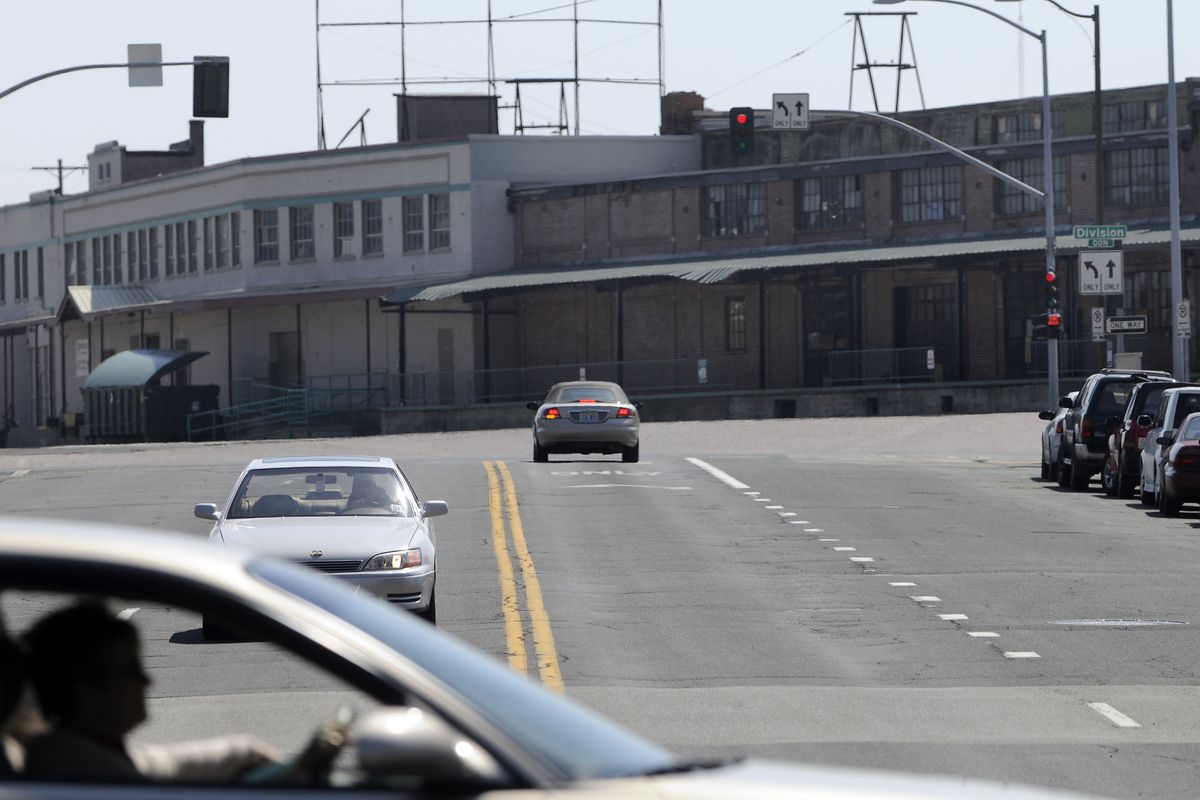Old ‘diamond’ may get new shine

A last-ditch effort is under way to save a historic downtown warehouse from a date with a wrecking ball.
A downtown developer who has restored other buildings in Spokane is asking the city and Washington State University-Spokane to hold off on the removal of the former Pacific Fruit warehouse at Riverside Avenue and Division Street.
WSU and city officials say they’re at least willing to listen to the proposal floated in the past few weeks by artist and developer Dan Spalding, who owns the Longbotham Building, home to the restaurant and lounge Zola and a Rocket Bakery.
The structure and another attached warehouse, both built in the 1920s by Northern Pacific Railroad, served as gateways for groceries entering and departing from Spokane. City officials plan to tear them down to make room for an extension of Riverside Avenue.
Spalding proposes to save only one of the warehouses, the one closest to Division Street.
“They have a great deal of value on a number of levels,” Spalding said. “They’re diamonds in the rough.”
Brian Pitcher, chancellor of WSU-Spokane, said he’s heard only a preliminary presentation from Spalding but will meet with him early this month for a detailed discussion. While WSU is willing to examine the concept, Pitcher said, the idea of saving the building never got much traction when the Riverside extension was designed. WSU has planned to convert remaining land into a small park.
“It’s really an isolated site that would not have any vehicle access,” Pitcher said.
But Spalding said the lack of parking shouldn’t be a problem, because plans for the city’s University District focus on creating a pedestrian-friendly area as part of a vibrant urban campus. He said he’s exploring the idea of putting a bike business and pub into the structure.
Spokane Public Works Director Dave Mandyke said WSU, which owns the land on which the warehouses sit, will make the final decision. One factor will be whether the building is structurally sound.
Construction on the Riverside extension, which will be called Martin Luther King Jr. Way, is scheduled to start early this spring. It will connect downtown to Trent Avenue near the Union Gospel Mission.
Dave Shockley, co-founder of the Spokane Preservation Advocates, said the buildings offer an opportunity to create a more energetic downtown.
“They’re part of our heritage,” he said.
A federal assessment of the Riverside project looked at routes that could save the warehouses. It found alternatives “not feasible,” partly because going around them would require Sirti, a technology assistance agency, to give up most of its parking. City officials say it’s too late to change the route but that they could save the portion of the building that’s not in the way of it.
The portion not in the way is what Spalding wants to save. The warehouse that could be saved, which is closest to Division Street, was first leased by Ryan Fruit. Pacific Fruit leased it later.
University and city officials rule out saving the building next door. That warehouse was first used by Western Piggly Wiggly, a locally owned grocery chain that became part of Safeway.
The city granted a demolition permit for the structures in July, even though tearing down the structures appears to be contrary to the city’s own demolition ordinance.
That law, which the Spokane City Council put on the books in 2005, says buildings in central Spokane that are eligible for the National Register of Historic Places can’t be torn down unless a replacement structure is planned. The new road doesn’t qualify as a replacement structure, and other exceptions don’t apply. Engineers listed WSU’s planned Biomedical and Health Sciences Building as the replacement even though the new building will be three blocks away and will be built regardless of what happens to the warehouses.
In response, the city’s historic preservation office has proposed tightening the ordinance to require new development affected by the rule to be built on old structures’ footprints. A draft was presented to the city Plan Commission in November.
“We’re trying to avoid the vast open spaces of downtown where you lose a lot of what the city is,” said Dennis Dellwo, a plan commissioner and former state representative. “The idea is to preserve Spokane’s downtown.”